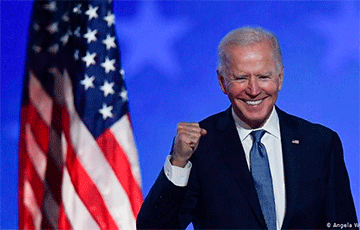The Atlantic Council Presents Recommendations to Biden on Relations with Belarus
57- 28.01.2021, 11:16
- 51,268

The new U.S. president has a historic opportunity.
According to BelaPAN, the report "Biden and Belarus: a strategy for the new administration," published on the website of the Atlantic Council mentions it. The authors of the report are Anders Åslund (Swedish-American journalist and diplomat), Melinda Haring (deputy director of the Eurasian Center of the Atlantic Council), John Herbst (former U.S. ambassador to Uzbekistan and Ukraine) and Alexander Vershbow (former U.S. ambassador to Russia, former Deputy Secretary-General of NATO).
"In 2020, Belarusians unexpectedly questioned the legitimacy of Alexander Lukashenko in the country's August presidential election. Lukashenko brazenly falsified the results, claiming to have won 80 per cent of the vote. However, neither the United States nor the European Union recognized his victory. A months-long protest movement has formed, demanding new elections under the supervision of the international community".
The authors of the report say that in recent years, "there has been no better chance for the U.S. leadership to promote sustainable positive change in Europe than the crisis in Belarus." However, it is not easy to ensure a democratic change in the country, given the internal resistance and Moscow's determination to prevent a new "colour revolution".
The report offers some recommendations for Biden to "promote the growth of the democratic movement in Belarus, strengthen the current opposition leader and weaken support for Lukashenko."
During the first 100 days of his presidency, Biden is recommended to meet with former presidential candidate Sviatlana Tsikhanouskaya.
Experts believe Biden should appoint a high-ranking official to coordinate joint actions with the EU, Britain and Canada on sanctions against Belarus, as well as to sign an order on sanctions against hundreds of Belarusian officials who violate human rights. These sanctions will serve as a deterrent to further escalation of repression. Experts at the Atlantic Council are ready to submit such a list for consideration.
"The United States should call Lukashenko the former president of Belarus. U.S. Ambassador to Belarus Julie Fischer should take her post in Minsk and visit Vilnius as needed, but not present her credentials to Lukashenko. The U.S. should impose sanctions on companies that handle Lukashenko's private finances. The U.S. should threaten sanctions against Russian companies and businessmen if they take over Belarusian companies or support Lukashenko's regime financially or politically. The U.S. should also impose sanctions on Russian media and journalists involved in propaganda campaigns against the Belarusian protest movement".
The report says the U.S. Congress should give "specific instructions to the Department of State to spend at least $200 million annually to support civil society and media in Belarus. Congress has recommendations to double the budget of the Belarusian service of Radio Svaboda.
"The Secretary of State should appoint a high-ranking official to supervise all assistance to Belarus and report quarterly to Congress. The United States (along with the EU) should send humanitarian aid to the opposition through channels that reach them in Belarus. The Secretary of State should support the unconditional release and amnesty of all political prisoners, advocate for the cessation of violence, and insist on an inclusive national dialogue to resolve the political crisis in Belarus and hold free and fair elections in the future".
The report also notes that the U.S. should use its influence in international organizations, such as the OSCE and UN, to ensure their active participation in resolving the Belarusian crisis by mediating dialogue, creating additional pressure on the regime, collecting evidence of crimes to eventually bring those responsible to justice.
The experts prepared a set of recommendations to manage "Russia's response to the events in Belarus to prevent Kremlin reprisals." "The Biden administration should caution privately the [Belarusian] opposition against any signals indicating an interest in joining the EU or NATO, and publicly explain its position in Belarus only as supporting the right of the people of Belarus to choose their leader and future. Along with the EU, the Biden administration should maintain a regular diplomatic dialogue with Moscow, emphasizing that the ongoing protest movement is only about Belarus' domestic politics, not geopolitics. The initial goals are to cease repression immediately, release prisoners, and begin a genuine, inclusive political dialogue that can provide the foundation for new internationally supervised elections".
Besides, the Biden administration "must draw a clear line on conditional sanctions: Moscow should understand clearly that it faces additional sanctions if it deploys security forces to Belarus (overtly or covertly, including military or personnel support) to support Lukashenko or disperse Belarusian protesters."
"These three recommendations for managing the Kremlin's response make up a package and should be implemented jointly. It would be a disaster to reconcile with the Kremlin by discouraging Belarus from applying to the EU without setting clear boundaries against Moscow's possible interference in Belarus."
The Atlantic Council is an American think tank founded in 1961 under NATO to promote cooperation between the United States and Western Europe.









